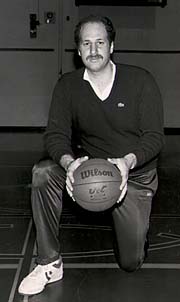
Finally Hangs It Up For Good In The Pool
The silver medal Reed Gershwind picked up in water polo at the recently completed World Games for the Deaf at Copenhagen is the last one he will pick up. The Copenhagen Games has become his swan song in the deaf aquatics sports world. Not out of sports, though, but out of competition, as Reed as aspires to become an athletic administrator, more likely with the American Athletic Association of the Deaf.
As a swimmer, Reed, who resides in the Rochester, NY area, towered over his opposition in the high school, NCAA-II and WGD swimming ranks. In fact no one could ever keep up with him event for event, stroke for stroke in the water.
And at the 1993 World Games for the Deaf at Sofia, Bulgaria, despite his advancing age, nearing thirties which is considered ancient in competitive swimming, he performed as the relay anchor leg. And to shock the audience he did, by overcoming a deficit of several lengths to catch up and win another gold for the Americans on one relay event. With that he announced his retirement from competitive swimming.
Retired from swimming, yes but not that ready to retire from the pool! A water polo player also, and flush from the surprising gold his USA team picked up at Sofia, he was hoping for a repeat at Copenhagen. Unfortunately it was not to be.
The Americans, thanks to the luck of the draw, drew water polo power Hungary in the opener, and lost 10-9. A desperate last second shot went astray. The Americans swept the remaining games, 6-4 over Netherlands, 11-5 over Germany and 9-7 over Italy to finish second. How would Reed drool over a rematch with Hungary.
How good was a much younger Reed as a swimmer? Well, as a high schooler in San Diego, he was offered scholarship offers from some big time NCAA-I swim programs. And even he was also considered to be of a NCAA-I level water polo caliber, good enough to have been offered scholarships offers in this sport only. It is akin to a high school baseball and football star, torn between a collegiate football scholarship and a minor league baseball contract.
After much thought and advice he decided on CSUN even though it was only a NCAA-II level program. He wanted an opportunity to intermingle with the deaf and felt the CSUN program was the right one for him. At CSUN, Gershwind was an all around swimmer at dual meets.
At national NCAA-II championships he focused on freestyle, medley, butterfly and relay events and became a 4-time All- American while winning three national championships.
Representing USA at four World Games for the Deaf (1981, 1985, 1989 and 1993) he won 29 medals, the most ever earned among WGD athletes in any sports. The Copenhagen silver became his 30th medal. A medal breakdown would consist of:
13 golds
9 bronzes
8 silvers
The American Athletic Association of the Deaf honored Gershwind by naming him as the 1992 Deaf Athlete of the Year.
Away from the pool he teaches business classes at NTID, having already earned a MBA from Rochester Institute of Technology.
Busy with the US Aquatics Association of the Deaf, Gershwind wants to develop a strong base of young deaf aquathletes for swimming and water polo and to focus on fund raising, recruiting overlooked swimmers, developing top coaches, etc.
One final question. Gershwind was asked “Did you ever face Jeff Float, the gold medal winning Olympic swimmer in any swim event?” Gershwind said “We both swam at the USC Invitational meet one season, but not against each other. He swam in his event and I swam in my event.”




